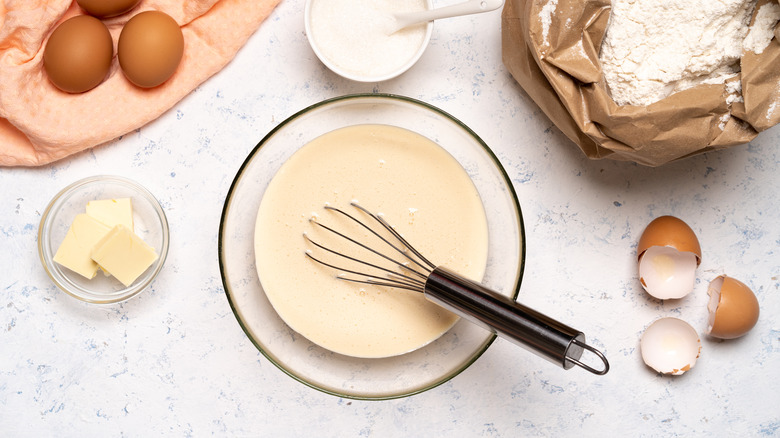Why You Should Think Twice Before Baking With Duck Eggs
Though chicken eggs are the universal standard when it comes to baking, there is no written rule that says you cannot swap them out for duck eggs. However, you will want to think twice before you do. Duck eggs are composed differently than chicken eggs. Not only are duck eggs physically larger, one can be twice the size of a jumbo chicken egg, their yolks make up about 42% of the egg's total weight. The whites also contain more albumen, a structure-building protein, than standard egg whites do. This means that duck eggs contain both more protein and more fat, which can have a tremendous impact on your end result.
While it may not seem like much, additional amounts of fat and protein can entirely change the nature of a bake. Do not expect a recipe to come out the same as it would have if you were using standard chicken eggs. Because of the increased fat and protein in the duck egg, the other ingredients in the recipe will respond accordingly. This means that you could get a bake with a completely different texture and flavor than what you are commonly used to. Now, you could either take the altered outcome for what it is or you could do a few calculations to see how you can replicate the baking results of chicken eggs with duck eggs.
Tips for baking with duck eggs
Though it is not generally recommended, swapping chicken eggs for duck eggs in your baking has everything to do with calculating substitutions. The accepted standard ratio for a duck-to-chicken egg substitution is 2:3, meaning two duck eggs are equivalent to three chicken eggs. While this deals with the volumetric issues in the recipe, the substitution ratio does not account for the extra fats and proteins in the composition of the duck egg.
If you're determined to use duck eggs or it's all you happen to have, you will also want to think about reducing the amounts of other fats and liquids in the recipe. This could mean anything from using half a stick of butter instead of a whole one or taking those two cups of milk down to one. Whatever volumetric substitutes or ingredient reductions you choose, experimenting with both will help you narrow down the ratios that will get you the traditional texture and flavor that you are used to.
Of course, this is all a matter of preference. Duck eggs have been known to yield naturally yellow and fluffy cakes, silky meringues, and thick, creamy custards. Just make sure to get your ratios right and you'll be enjoying their bold and rich flavor in your next dish.

